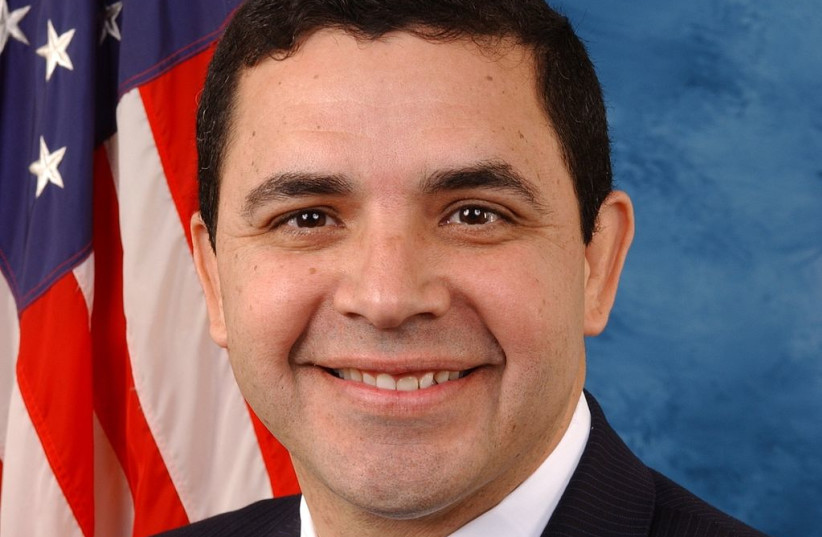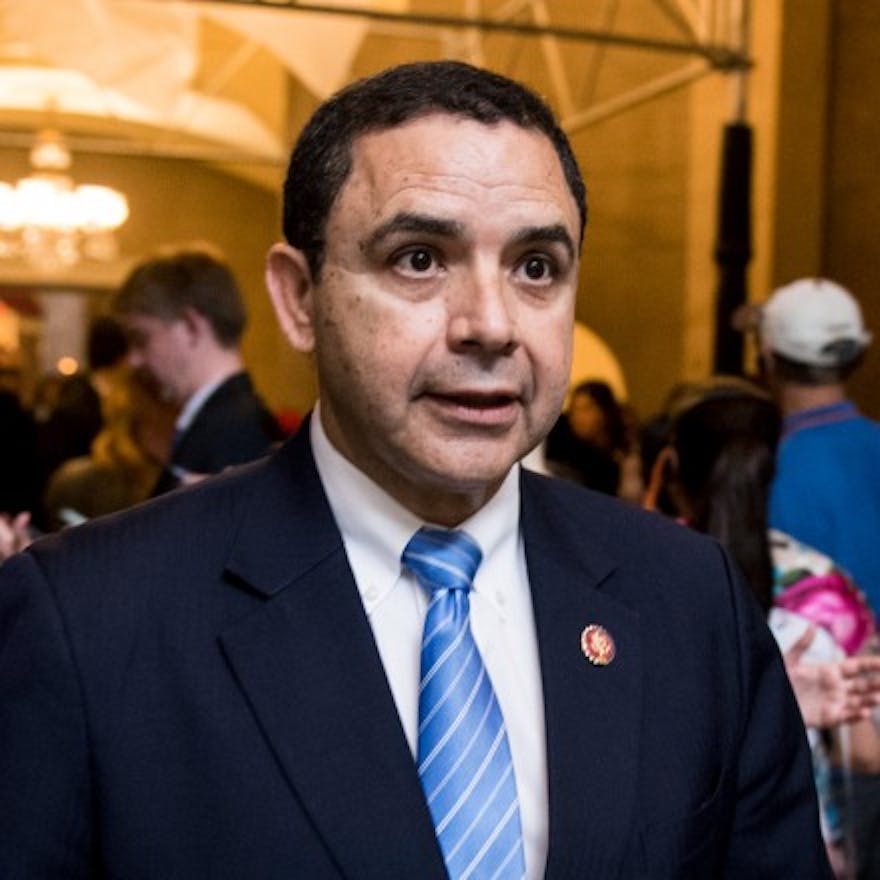The new caucus is drawing criticism from Jewish Democratic leaders.
By SHIRA HANAU/JTA
Published: JANUARY 21, 2022

(photo credit: Sruly Saftlas/CNW Group/Dirshu)
Two non-Jewish members of Congress announced the formation of the Congressional Caucus for the Advancement of Torah Values Wednesday in an effort “to pledge our friendship to our Jewish friends,” according to a statement by Republican Don Bacon, who is co-chairing the caucus.
“This Caucus is going to be so important in a bipartisan way. We have to be able to have the strength so we know what’s good, what’s bad, what’s moral and what’s not moral,” Rep. Henry Cuellar, a Democrat who is the caucus’ other chair, said in a statement.
Cuellar, one of the more conservative Democrats in Congress, appeared to be the only member of his party present at the meeting. A photo from the meeting showed Republicans Kat Cammack, Dan Meuser and Brian Fitzpatrick in attendance in addition to Bacon and Cuellar.
(Coincidentally, Cuellar’s home was searched by the FBI Wednesday in a “court-authorized law enforcement activity” according to an FBI statement provided to news outlets.)

None of the 37 Jewish members of the current Congress appeared to be participating in the new caucus.
The meeting was also attended by Rabbi David Hofstedter, the Canadian founder of an Israel-based organization called Dirshu. The mission of the organization, founded in Toronto in 1997 but now based in Jerusalem, is to encourage the study of Torah.
Speaking to the group at the opening session, Hofstedter claimed that “Torah values” were the “foundation of the USA” and repeatedly mentioned freedom of religion as one of those “Torah values.”
He also spoke about antisemitism and criticized the closure of synagogues and yeshivas in New York during the height of the COVID lockdowns, and called those closures “uneven-handed” and “inconsistent with city and state policy.”
The new caucus is drawing criticism from Jewish Democratic leaders.
“There are many challenges facing Jewish Americans, including the insidious threat of antisemitism,” tweeted Haile Soifer, CEO of the Jewish Democratic Council of America. “With all due respect to our non-Jewish friends, the creation of this caucus is not the way to address them, nor are our “Torah values” in need of your advancement.”
The Voter Education Foundation, linked to abortion ban advocates, sponsored ads against the conservative Democrat’s primary challenger, Jessica Cisneros.

Rep. Henry Cuellar, D-Texas, speaks to members of the media in the U.S. Capitol in Washington, D.C., on Sept. 30, 2021. Photo: Al Drago/Bloomberg via Getty Images
Sara Sirota
January 20 2022, 7:01 p.m.
AN ADVISER TO Rep. Henry Cuellar, the conservative Texas Democrat whose home and campaign office was raided by the FBI this week, also leads a dark-money group that recently ran ads against Cuellar’s primary challenger, Jessica Cisneros, according to Federal Election Commission and corporate records. Colin Strother, a longtime Cuellar aide and a consultant who has been embedded on Cuellar’s campaign, is also the head of the secretive Voter Education Foundation. The staffing overlap reveals Cuellar’s close proximity to one of Texas’s most zealous anti-abortion activists.
Cuellar and his inner circle have aggressively pushed the limits of campaign laws. Election law stipulates a cooling-off period of 60 to 120 days, depending on the circumstances, before launching an independent spending effort on behalf of that campaign. Otherwise, it doesn’t meet the definition of independent as outlined in Citizens United.
Strother was Cuellar’s campaign manager last cycle, though FEC records show he worked this year as an outside consultant. He was paid by the campaign in August 2021 — the most recent period for which records are available. Strother’s Twitter account was also mysteriously deactivated.
In December 2021, the group, a 501(c)(4) that does not disclose its donors, sponsored signs and ran a flippant TV ad that called Cisneros the “South Texas Jobs Grinch.” Cisneros, the daughter of Mexican immigrants, is a human rights attorney who worked with immigrants and asylum-seekers confronting oppressive Trump and Biden administration policies. Her 2022 run marks her second attempt to oust the nine-term Cuellar, who is the largest Democratic recipient of private prison donations and was one of the most frequent Democratic supporters of Donald Trump’s policies in the House. (President Joe Biden won the district in 2020 with 52.8 percent of the vote.)
Strother has been director of the Voter Education Foundation since its founding in September 2020, according to public records. Strother has been on Cuellar’s campaign payroll on and off since 2003. During that time, Strother became a well-known Democratic campaign strategist on Democratic campaigns across Texas, also working for Roland Gutierrez, a state senator.
Though Strother was not working for Cuellar’s office in Washington at the time, documents from a court case against Cuellar reveal Strother was involved in high-level staffing and policy discussions with the congressman. When Cuellar’s acting chief of staff, Kristie Small, sued him in 2019 for allegedly firing her for being pregnant, Strother submitted testimony stating he vetted every senior staff hire since 2005 and found Small to be “lazy” and a “weak manager.” After the Washington Post reported on an initial complaint she filed with a congressional office seeking counseling, Strother questioned staffers about their knowledge of Cuellar’s supposed probationary rules for employees, and emails shared with the court also showed Strother was included in policy discussions with congressional aides.
Despite Strother’s consulting work for numerous Democratic politicians in Texas, a number of Republican political figures were also involved in the founding of the Voter Education Foundation he directs.
Records show abortion ban radical Bradley Pierce submitted the group’s certificate of formation to the Texas secretary of state. Pierce is the executive director of Abolish Abortion Texas and the Foundation to Abolish Abortion, as well as the vice president and general counsel at Heritage Defense, a nonprofit law firm that advocates for “the God-given parental rights of Christian, homeschooling families.” The Texas Observer in 2017 called Abolish Abortion Texas “the most extreme anti-abortion group at the Texas Lege” and reported that the group helped advance the “abolition of abortion” to the Texas Republican Party platform at its state convention. The organization is also tied to state Rep. Tony Tinderholt, R-Arlington, who in 2019 introduced a bill that would force women who had abortions to face the possibility of the death penalty for homicide.
Cuellar is the most anti-choice Democrat in the House of Representatives, but his apparent links to such an extremist have not been previously known. He was the only House Democrat to vote against a historic bill to protect abortion access in September — just a few weeks after the most restrictive anti-abortion law in the country went into effect in Texas. Cuellar defended his vote by saying abortion is “not a health issue.” He hasn’t commented on the Texas law.

Related
Emails Show Rep. Henry Cuellar Provided Extensive Favors to Border Security Lobbyists
Cuellar has previously come under scrutiny for providing favors to border security lobbyists and pushing for funds for increased drone surveillance. His conservative record led corporate trade associations and Americans for Prosperity Action, a super PAC funded by billionaire Charles Koch, to spend hundreds of thousands of dollars boosting his campaign against Cisneros in 2020. On Thursday, ABC News reported the FBI raid was related to a wide-ranging probe involving Azerbaijan business interests.
In addition to Bradley Pierce, the Voter Education Foundation’s records referred to past San Antonio mayoral candidate Greg Brockhouse as a director at the time of its founding. When Brockhouse again unsuccessfully ran for San Antonio mayor last year, he sought to charm Trump voters on the campaign trail, such as when he skirted a reporter’s question in December 2020 asking if Biden was the president-elect and instead highlighted the issue of voter fraud and Trump’s right to challenge the results in court. His campaign was also plagued with reports showing his ex-wives both filed separate domestic violence complaints against him, years apart.
Public records reveal GOP political operative Thomas Marks and law enforcement bureaucrat Mike Rodriguez are also serving as officers with the Voter Education Foundation. According to his LinkedIn account, Marks was chief of staff until this month for Bexar County Commissioner Trish DeBerry, a Republican who in December announced she was running for a county judge position “because she didn’t see enough Republican representation.” He has also worked as a consultant for other GOP politicians, including former Speaker of the Texas House Joe Straus. Rodriguez, meanwhile, is chief of staff for the Corpus Christi government, where he oversees the police and fire departments.
Strother and Cuellar’s campaign did not immediately respond to requests for comment.










